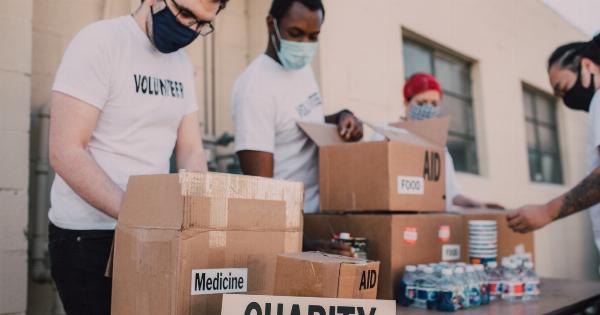Cancer is a devastating disease that affects millions of people worldwide. While there is no surefire way to prevent cancer, there are certain steps you can take to lower your risk and lead a healthier life.
By incorporating these simple strategies into your daily routine, you can significantly reduce your chances of developing cancer. Here are five easy steps you can start implementing today:.
1. Maintain a Healthy Diet
Eating a nutritious diet is crucial for overall health, including reducing your risk of cancer. Focus on consuming a variety of fruits, vegetables, whole grains, and lean proteins.
These foods are packed with essential vitamins, minerals, antioxidants, and fiber that can help prevent cancer.
Avoid processed foods, sugary snacks, and excessive consumption of red and processed meats, as these have been linked to an increased risk of cancer.
Instead, opt for natural and unprocessed alternatives that provide your body with the nutrients it needs to stay healthy.
2. Engage in Regular Physical Activity
Regular exercise not only helps you maintain a healthy weight but also reduces your risk of developing cancer.
Engaging in physical activity for at least 30 minutes a day can make a significant difference in preventing certain types of cancer, such as breast and colon cancer.
Find activities that you enjoy, such as walking, jogging, swimming, or dancing, and incorporate them into your daily routine. Remember to start slowly if you are new to exercise and gradually increase the intensity and duration of your workouts.
3. Quit Smoking and Avoid Secondhand Smoke
Smoking is one of the leading causes of cancer, including lung, throat, and mouth cancers. Quitting smoking is the single most important step you can take to lower your risk of cancer and improve your overall health.
If you are a smoker, seek support from professionals or join cessation programs to help you quit. Additionally, avoid being around secondhand smoke, as it also increases the risk of cancer.
Create smoke-free environments for yourself and your loved ones to minimize exposure to harmful chemicals.
4. Protect Yourself from the Sun
Excessive exposure to ultraviolet (UV) rays from the sun can lead to skin cancer, one of the most common types of cancer. Protect your skin by following these simple steps:.
– Apply sunscreen with a high SPF (Sun Protection Factor) regularly, especially when spending time outdoors.
– Seek shade during peak sun hours, typically between 10 am and 4 pm, when UV rays are the strongest.
– Wear protective clothing, such as wide-brimmed hats, long sleeves, and sunglasses that block UV rays.
– Avoid tanning beds and sunlamps, as they emit harmful UV radiation.
5. Get Regular Screenings and Vaccinations
Regular screenings and vaccinations can play a significant role in detecting cancer at an early stage or even preventing certain types of cancer altogether.
Consult with your healthcare provider to determine which screenings and vaccinations are appropriate for your age, gender, and overall health.
Some common cancer screenings include mammograms for breast cancer, Pap tests for cervical cancer, colonoscopies for colorectal cancer, and regular skin checks for skin cancer.
Vaccines are also available for certain viruses that can lead to cancer, such as the human papillomavirus (HPV) vaccine.
Conclusion
Lowering your cancer risk doesn’t have to be complicated.
By following these five simple steps—maintaining a healthy diet, engaging in regular physical activity, quitting smoking, protecting yourself from the sun, and getting regular screenings and vaccinations—you can take control of your health and reduce your chances of developing cancer. Remember, small changes can make a big difference when it comes to cancer prevention.





























